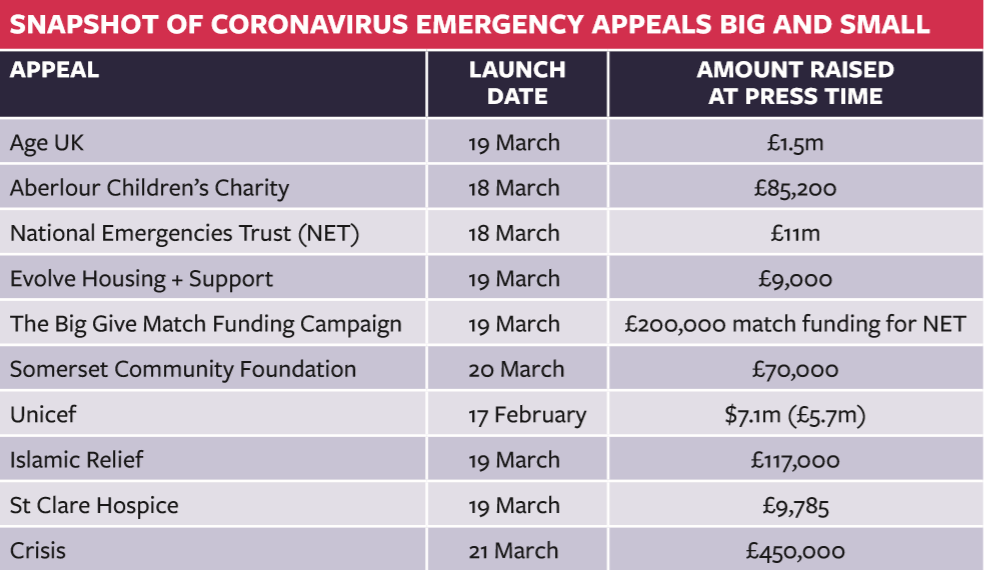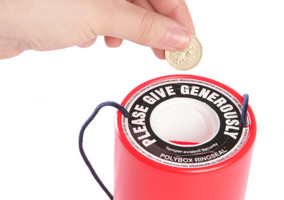For many weeks, coronavirus was a threat looming a world away. Even as it started edging closer, moving from China to Europe, few people were prepared for the rapidity with which it started shattering the foundations of our society.
As events got cancelled and people were told not to leave the house, it quickly became clear that for charities and fundraising the consequences could be dire. But how dire? And what can fundraisers do to limit the damage?
Gauging impact
These days, income forecasting has become an exercise in precognition. “Once it became clear that coronavirus would have a significant impact, our fundraising team worked out the possible effects,” says Alex Hyde-Smith, director of fundraising at Alzheimer’s Society. “This ranged from almost no impact on income at all, to several millions lost. While we cannot accurately predict the length and scale of the crisis, we suspect the impact will be significant.”
In March, NCVO estimated that the charity sector could lose £4.3bn in 12 weeks. This figure is conservative and does not factor in that charities are seeing the need for their services surge in a number of ways, from older people requiring extra support to homeless people in need of a safe place to self-isolate.
The Institute of Fundraising estimates that no further face-to-face fundraising in 2020-21 could translate into the loss of 800,000 supporters and hundreds of millions of pounds for charities.
Alex McDowell, head of public fundraising at RNIB, says: “This is a fast moving and unprecedented situation, and nobody knows exactly how things will change in coming weeks or months. We therefore need to focus on what we do know and be prepared to change plans quickly.”
Charities are constantly having to re-forecast and make extremely difficult decisions. Claire Rowney, executive director of fundraising, marketing and communications at Macmillan Cancer Support, says: “Within our portfolio, we have literally thousands of activities. We are having to look at every single activity and think about how relevant it is and what the risk is.
“We have a big community base and this will have a really significant impact on our income. But we are not alone: this will be true for every charity in the UK.”
Postponing events
Events and community fundraising were some of the first channels to be hit. The most obvious response has been to postpone events instead of cancelling them. The London Marathon, for example, which last year raised some £66m for charity, has been moved from March to October.
However, this comes with its own set of challenges. It disrupts cash flows and inevitably overcrowds the event calendar in autumn. We also do not know for sure how long the emergency will last.
“If coronavirus peaks over the next couple of months and then life starts returning to normal towards mid-summer, we will have lost maybe £1m, but in the grand scheme of things we can still carry on doing what we are doing,” says Richard Lee, director of fundraising at Crisis. “If it lasts into autumn or winter, then we risk really significant impact.”
By that point, the window to hold postponed events such as the London Marathon will have closed.
For cancelled events, the Fundraising Regulator warns that in some cases donations might have to be refunded. However, it is worth explaining the situation to supporters first to see if they still want to help.
Hyde-Smith says: “We are encouraging people to honour their donations to friends and family who were due to take part in events, even if they have been cancelled. We are very lucky to have great supporters and very grateful that nearly everyone does this.”
Organisers of the London Landmarks Half Marathon, originally scheduled for 29 March, are also looking to reschedule for later in the year.
Other income streams
Unfortunately, events and face-to-face fundraisers are not the only ones with difficult months ahead. Although in different ways, most areas of fundraising are likely to be impacted somehow.
For individual giving, philanthropy and corporate, there is both good and bad news. On one hand, donors understand this is a really difficult time and want to help. On the other hand, the economic landscape does not allow them to support charities as much as they would like.
Lee says: “A number of our corporate partners have rung us up and said: ‘We are with you, let us know how we can help, change what you are doing with the money if you have to’. But some others are saying: ‘Our businesses are at risk of collapse, we want to support you, but we can’t’.”
Commenting on individuals potentially offering to increase their donations, Lee says: “It is probably a short-term thing. As the economic impact kicks in, you would imagine that some people will simply not be able to afford to support us, no matter how much they want to.”
Even legacies are not necessarily going to be unaffected. RNIB, which is heavily reliant on legacy giving, expects it will take a hit.
“A higher mortality rate may lead to more legacy gifts in the next 12-18 months, but in the short term, I think this will have a really negative impact on legacy income,” says McDowell. “The impact will come from reduced average gift values as a result of reduced house and share values and, perhaps even more critically, increased administration times, as the housing market may all but cease, along with reductions in the capacity of the probate services, HMRC, solicitors and estate executors.”
Going digital
Digital will inevitably have an important part to play during the crisis, starting with virtual events and trading income. For example, the London Landmarks Half Marathon is asking participants to run solo in their local area instead, maintaining their fundraising target.
Charities are also looking to their online functions particularly those that have a large retail element to their fundraising. Many of them, including Oxfam and Cancer Research UK, are keeping their online shops open and encouraging donors to look there.
Fee Gilfeather, head of audience and strategic planning at Oxfam, says: “In the week before shops closed, sales had dropped by approximately 20%, while donations of goods fell by around 10%.”
Oxfam had to stop all sales and collections of secondhand goods, but new products are still available on the online shop as orders can be processed with staff maintaining social distancing.
Oxfam is also helping supporters to adapt their plans and consider virtual events instead, says Gilfeather. “We are advising supporters that they can make financial donations online and through Facebook Donate.”
For many organisations, integrating digital in all fundraising activities used to be a long-term strategy that could be implemented gradually. Coronavirus has turned it into an urgent necessity.
RNIB’s McDowell says: “We were always looking at moving away from face-to-face fundraising, gradually. Now we might have to do it less gradually. In a sense, we are not changing strategy: we are just changing the pace of the strategy.”
Emergency appeals
A number of charities, big and small, have launched coronavirus emergency appeals, both to cover their normal costs and to increase their services. Although appeals such as these are a great way of channelling people’s instinct to help during a crisis, they also risk saturating the market.
McDowell says: “Any appeal for extra money needs to be 100% authentic, either by showing how we are proactively responding to changing needs, or because vital services are at risk – and for most charities, this will be the truth.
“But I do worry that if everyone is doing emergency appeals, there is a risk of potential wastage. Everyone will be doing the same, not thinking that our supporters are often the same too.”
A potential solution is doing collaborative appeals, and this is where bigger charities with stronger brands could have a role to play in supporting smaller organisations.
Crisis and Islamic Relief are both going in this direction. Islamic Relief launched an emergency appeal and made £500,000 immediately available for local charities, including food banks facing shortages. It is still actively seeking partners. Similarly, Crisis’s In This Together campaign is raising funds for both the charity itself and for its grant scheme supporting local homeless charities.

Audience focused
Fundraising has never been an easy job, but this crisis has taken its complexity to a whole new level. However, panicking is no good to anyone. So what is the best way to respond?
Lee at Crisis says: “We need to look at it through the supporters’ eyes. We need to think that their lives have changed massively. How are they living it? What challenges are they facing? How can they fundraise? It has never been more important to be genuinely audience focused.”
Ayesha Malik, national community fundraising operations manager at Islamic Relief UK, adds that it is helpful to do this in a targeted way. “While your organisation may be sending email shots and DMs, from a one-to-one fundraising perspective the value of a personal call, personal email or even a personal WhatsApp message is priceless,” she says. “Personalise, personalise, personalise.”
Other key words are honesty and authenticity. Alzheimer’s Society’s Hyde-Smith recommends including donors in planning and communication. And most importantly, being honest with them. “Let them know if this situation will cause major disruption for the charity they love and if there is anything they can do to help.”
Lee agrees: “As finances become really tight, there is a risk that we return to some of the practices that were damaging for the sector. But I think we have learned that honesty, openness, engagement, trust, support and understanding are the right ways to drive forward.”
McDowell concludes: “We need to make donors feel part of the solution. Make it clear that there is no us and them. Tell them: ‘We are all in this collectively, this is what we are doing, we would love your support and need it more than ever’. So don’t stop communicating. Don’t stop asking. Don’t stop fundraising.”
Quirky Covid fundraisers
As organisations launch coronavirus national appeals, individual fundraisers have been using their time in self-isolation to think up innovative ways to raise cash for their cause.
Claire Singlehurst, head of regional fundraising, events and supporter care at Macmillan Cancer Support (pictured left), got on her bike to raise funds for Macmillan nurses tweeting: “For every donation, I’ll post a bike selfie, which over 30 days will evidence just how badly I need to see my hairdresser.”
Another fundraising trend on social media that has been gaining some traction among fundraisers working from home is to donate the money they would have spent on travel and lunches to charity. Ryan Stanley, community fundraiser at Alzheimer’s Society (pictured below), posted: “I’m working from home for the foreseeable future, so I’ve created a virtual collection tin and will be donating my normal lunch and petrol costs to @alzheimerssoc for the coming weeks.”
Head of philanthropy and special events at Barnardo’s, Lily Rose, reinvented the #icebucketchallenge as the #safespacechallenge, challenging people to build a “fort” at home and donate £3 to Barnardos. “I now nominate you to build your forts! Don’t forget to to donate £3 and to nominate more people,” she tweeted.
Do small things well when it comes to major donors, says Ikhlaq Hussain
The difficult financial climate in coming weeks and months will be extremely challenging for small and medium charities. Since the coronavirus outbreak, the majority of major donor events and meetings have been cancelled or postponed, which will have a huge impact on our income in months to come.
So in a time when we are unable to do big things to raise money, we need to find ways to do small things in a great way to connect with our major donors. Here are a couple of things you can action straight away:
1. Get your trustees on the phone:
Research has proven so many times that donors love to communicate with trustees. It is much easier for small charities to organise calls by their trustees to their donors to ask them how they are coping with the current lockdown. Let your donors know how much you care about them and how much you appreciate their continued support.
2. Best wishes cards or emails:
If you can’t get donors on the phone, send them best wishes in the post. In the current climate, everyone is looking for something to brighten up their day. Let’s be more creative and thoughtful. Send a handwritten card or note from one of your trustees. This can be followed up with a personal email. If you can get a best wishes message for the donor from one of your beneficiaries, that will be a bonus.
Ikhlaq Hussain is the head of philanthropy and partnerships at Orphans in Need












